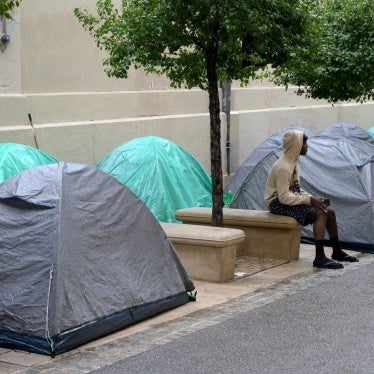(Brussels, November 19, 2013) – African Union and European Union countries should work together to strengthen protections for human rights defenders in Africa and migrants in Europe, Human Rights Watch said in recommendations to the AU and EU released today. The annual AU/EU human rights dialogue will be in Brussels on November 20, 2013.
The agenda for the human rights dialogue includes key developments in Africa and Europe as well as thematic issues such as protection of women and children in conflict settings, and the rights of domestic workers, migrants, and people with disabilities.
“The African Union and European Union should together address worrying geographic trends such as increasing attacks on the media and on human rights work in some African countries,” said Lotte Leicht, EU director. “They also need to do better to protect migrants and asylum seekers, and to end discrimination and xenophobic attacksin Europe.”
The proliferation of a wide range of nongovernmental organizations and independent media has been among the most important developments across Africa in the past two decades. However, the trend has provoked a backlash in a number of countries, particularly those governed by longstanding, often authoritarian leaders and ruling parties that fear and suppress independent criticism, political opposition, and peaceful public dissent.
The backlash has taken the form of threats, harassment, arbitrary detention, killings, and prosecution of human rights defenders. It has led to censorship of independent media and activists; laws that violate fundamental rights to freedom of expression and association; and unlawful state efforts to undermine, bar, or crack down on peaceful protests.
“Protecting human rights defenders – whether individuals, groups, lawyers, or journalists – is fundamental to ensuring everyone’s ability to know, understand, and enjoy their rights,” said Leicht. “The AU and EU should reject the clampdowns on independent media and human rights defenders that we see in many African countries.”
The AU-EU dialogue should also address key concerns in Europe, including the rights of migrants and minorities. The approach of the EU and its member states to migration and asylum is too often characterized by an emphasis on migration control and border enforcement at the expense of the rights of migrants and asylum seekers, including the right to seek asylum. Despite efforts to harmonize asylum procedures and standards across the EU, asylum seekers face gaps in protection in a number of member countries.
The death of over 360 people on October 3 in a shipwreck off the Italian island of Lampedusa focused the EU’s attention on boat migration in the Mediterranean. However, many of the proposed policy responses, though framed in terms of saving lives, reflect the EU’s longstanding preoccupation with preventing departure and barring entry. The EU should move swiftly to enhance efforts to save lives at sea, while ensuring respect for other fundamental rights.
Discrimination and intolerance against minorities, including Muslims and Roma, and migrants is also a serious concern across the EU. Despite binding international and regional norms on combating hate crimes, numerous EU countries lack robust legislation and machinery to adequately address violence based on ethnic or racial prejudice. Human Rights Watch has documented the failure of police and the judiciary in Italy and Greece to investigate, prosecute, and punish appropriately xenophobic attacks against migrants and minorities, and the inadequacy of state response to hate crimes in Germany.
“The AU-EU dialogue should reaffirm the importance of fair and effective asylum procedures and decent reception conditions,” Leicht said. “EU members should also ensure a robust response to hate crimes, prohibit ethnic profiling, and address the widespread discrimination against Roma and other minorities.”






